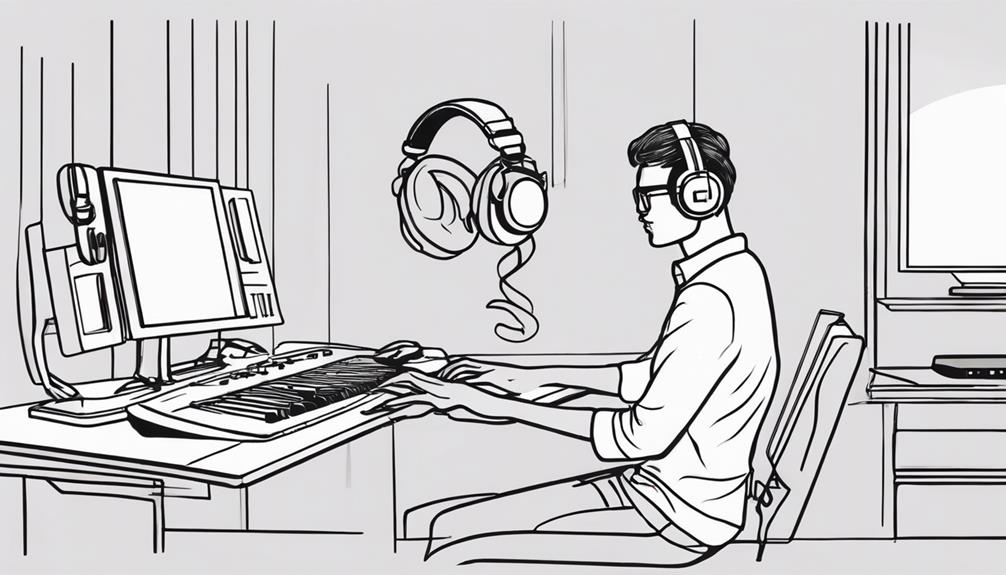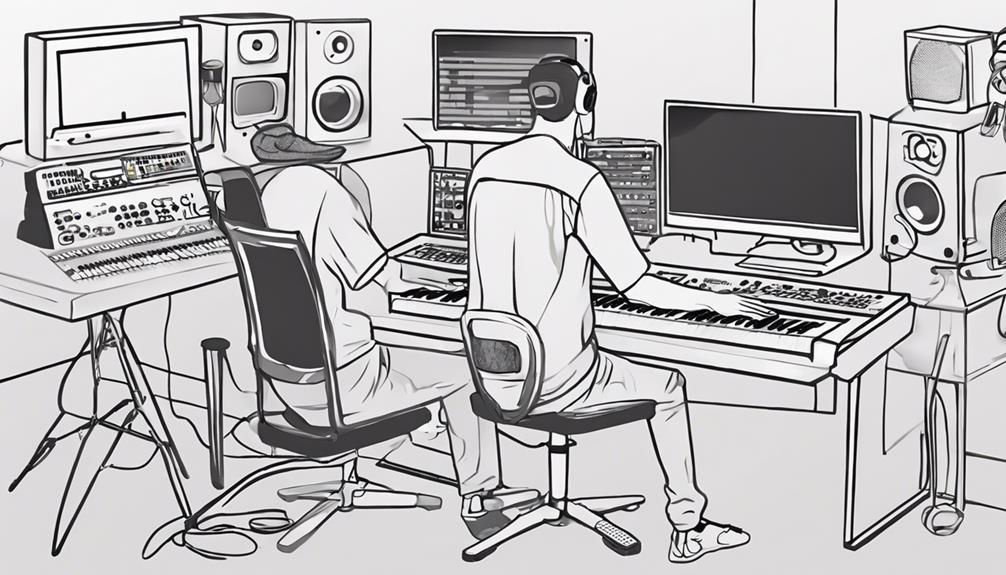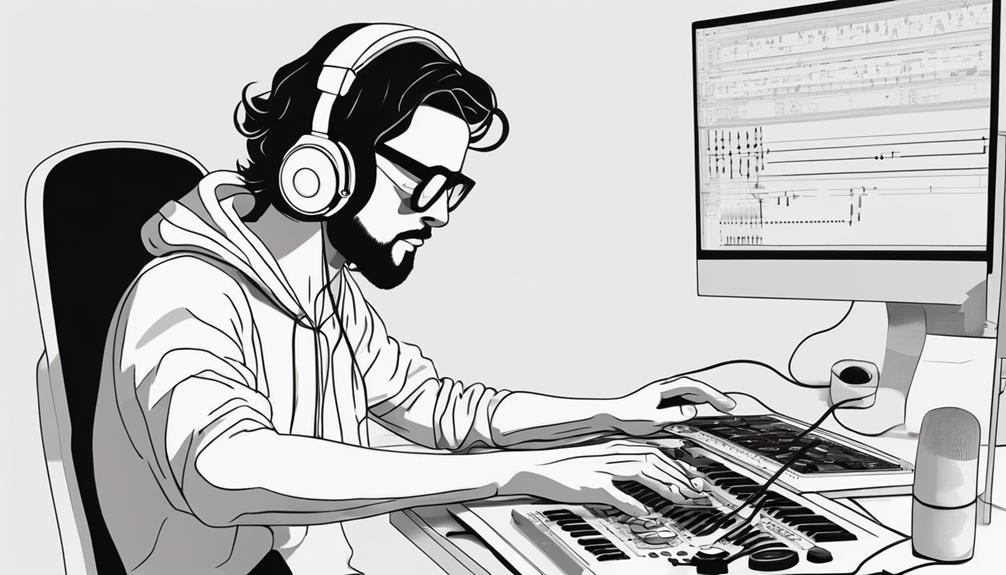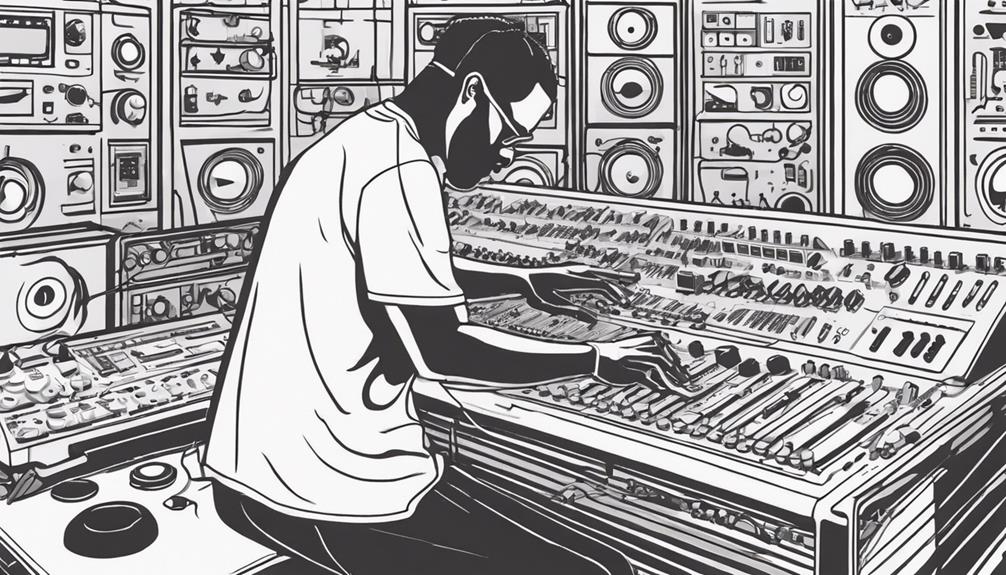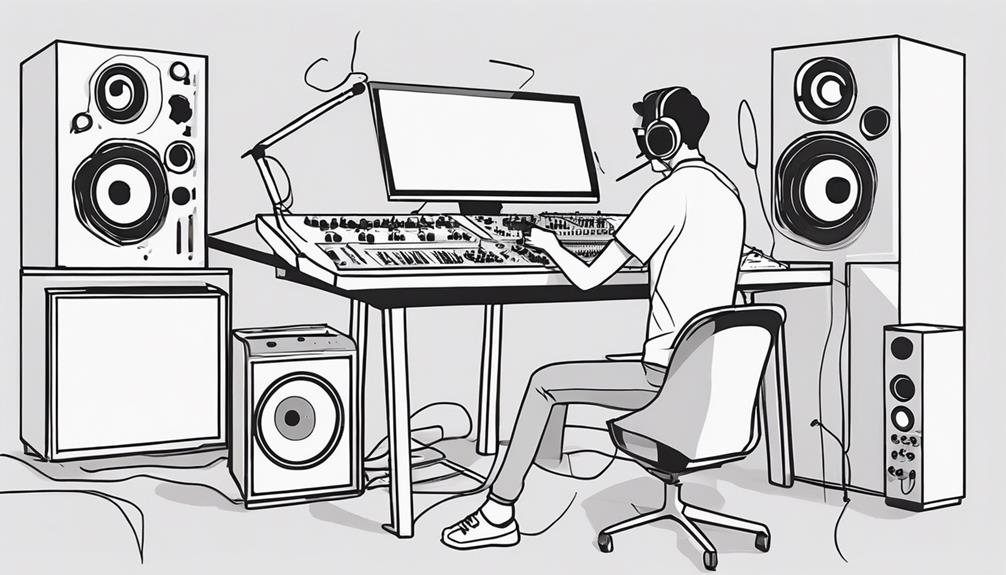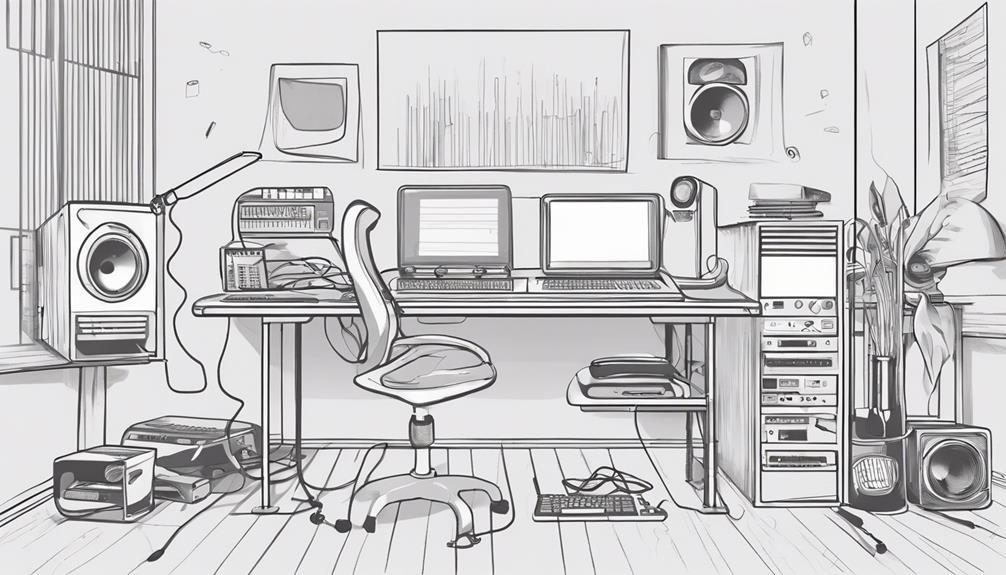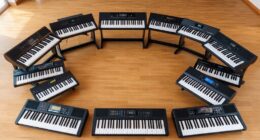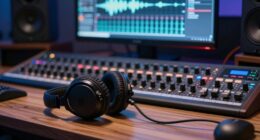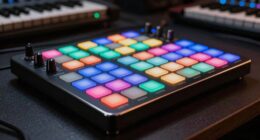Ready to begin electronic music production? Start by investing in essential tools – a computer, MIDI controller, sound card, speakers, and a Digital Audio Workstation (DAW). Learn about different subgenres like house and techno. Understand song structures with key elements like intros and choruses. Collaborate with fellow producers for valuable insights. Utilize resources like online music schools and mentorship programs. Tips? Dedicate time to learning, grasp production techniques, and explore software functionalities. Build a quality setup with the right equipment. Experiment and collaborate with others. This guide will help you kickstart your journey in electronic music production! Practice regularly to sharpen your skills and develop your unique sound. Dive into tutorials and forums to discover how to start electronic music projects effectively and troubleshoot challenges along the way. Stay patient and consistent, as progress comes with time and dedication.
Key Takeaways
- Invest time in online tutorials, courses, and forums for essential production techniques.
- Build a quality setup with studio headphones, monitors, MIDI controllers, and sound libraries.
- Experiment with sound design, MIDI sequencing, effects, and seek feedback from experienced producers.
- Learn music theory concepts to understand software functionalities and improve production skills.
- Collaborate with musicians, attend workshops, and utilize resources like Sonic Academy and Udemy.
Essential Tools for Electronic Music Production
To immerse yourself in electronic music production effectively, you need to equip yourself with essential tools such as a computer, MIDI controller, sound card, and a set of speakers. These tools are the foundation of your creative process in the domain of electronic music.
The Digital Audio Workstation (DAW) is where the magic happens – it allows you to sequence, record, arrange, and mix sounds with ease.
Samples and plugins play an essential role in adding texture and complexity to your tracks, enhancing the overall quality of your music. Understanding track composition and arrangement is important for creating engaging electronic music that flows seamlessly.
Having the right equipment and tools at your disposal is the first step towards mastering the art of electronic music production. So, make sure to invest in quality gear to kickstart your journey into the world of electronic music creation.
Exploring Subgenres and Styles
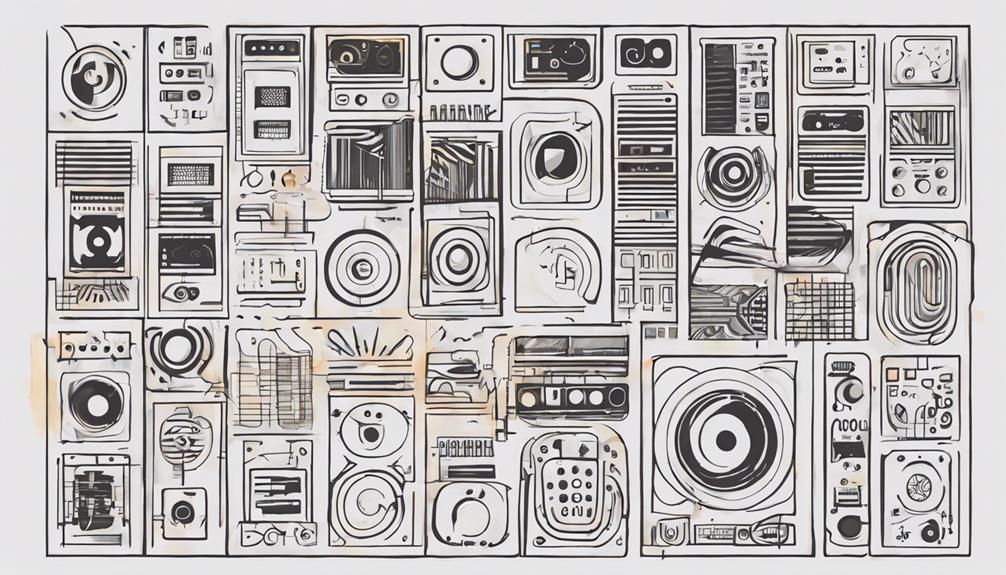
Explore the diverse world of electronic music by investigating various subgenres and styles that showcase unique characteristics and sounds. Electronic music genres like house, techno, future bass, trap, and Dubstep offer a rich tapestry of sounds for you to immerse yourself in. Here's a brief overview of some key subgenres:
| Subgenre | Description |
|---|---|
| House Music | Originating in Chicago, characterized by repetitive beats and vocal samples. |
| Techno Music | Emerged in Detroit, featuring repetitive beats, synthesizers, and futuristic sounds. |
| Future Bass | Combines trap, hip-hop, and R&B elements with lush chords and emotional melodies. |
| Trap Music | Originating in the Southern US, known for aggressive beats, hi-hats, and booming 808 bass. |
| Dubstep | Recognized for heavy basslines and syncopated rhythms. |
Each subgenre brings its own flavor to the electronic music scene, from the emotional melodies of future bass to the gritty basslines of Dubstep. As you explore these styles, you'll discover the diverse range of sounds and moods that electronic music has to offer.
Understanding Song Structure Elements
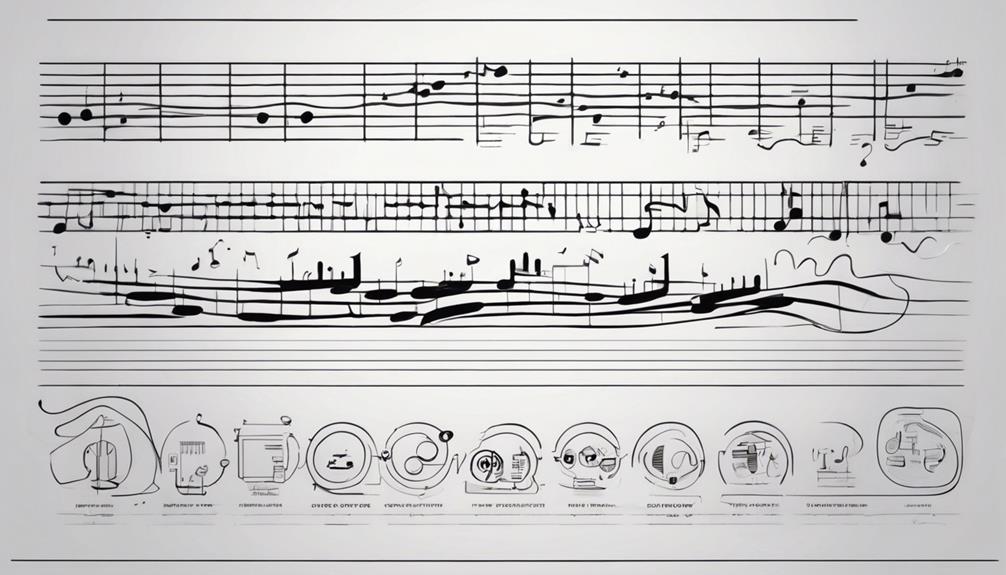
Understanding the elements of song structure in electronic music is essential for crafting engaging and dynamic tracks. Here are some key components to keep in mind:
- Intro: The intro sets the mood for the track, introducing listeners to the overall vibe and sound of the music.
- Verse: Verses develop the musical theme and lyrics, building up towards the main hook of the song, which is usually the chorus or drop.
- Riser/Build: Risers or build-ups are pivotal for creating tension and anticipation within the track before the energetic release of the chorus or drop. These sections help elevate the mood and prepare the listener for the climax of the song.
Incorporating these elements effectively in your tracks can help you maintain the listener's interest, build up anticipation, and add variation to your music, ultimately creating a more compelling listening experience.
Collaborating With Producers and Artists
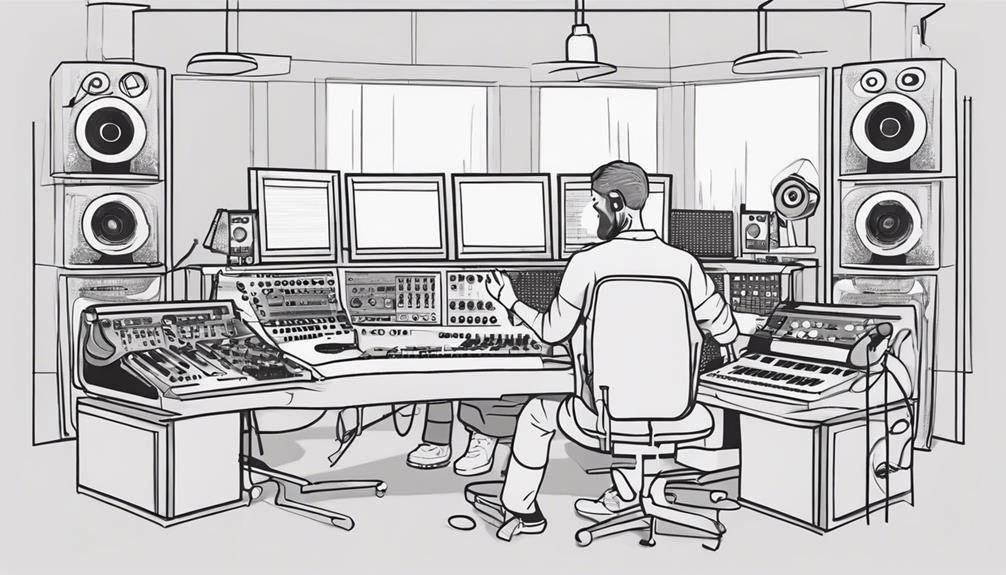
When you collaborate with producers and artists, you can build creative partnerships that bring fresh perspectives and ideas to your music.
Sharing project visions allows for a cohesive direction and a more unified sound in your productions.
Enhancing your production workflow through collaboration can streamline processes and help you create music more efficiently.
Building Creative Partnerships
Collaborating with producers and artists in electronic music production can greatly enhance your creative skills and broaden your musical perspective. When building creative partnerships in the industry, consider these key points:
- Shared Production Techniques:
Working with others allows you to learn new production techniques and approaches that you mightn't have discovered on your own. This exchange of knowledge can push your creativity to new heights.
- Mentorship and Feedback:
Collaborating with established producers and artists can provide valuable mentorship and guidance. Receiving feedback and constructive criticism from experienced individuals can help you hone your music production skills and grow as an artist.
- Industry Exposure:
Building a network of creative partners can open up doors for collaborations, performances, and exposure in the electronic music industry. These partnerships can lead to exciting opportunities that may not have been possible on your own.
Sharing Project Visions
Sharing project visions with producers and artists can lead to a rich exchange of creative ideas and perspectives in electronic music production. Collaborating with experienced individuals offers valuable insights, feedback, and mentorship, refining project visions. This collaboration allows for diverse perspectives, creative input, and the exploration of new ideas, enhancing your music production journey.
Networking with peers opens doors to potential collaborations, learning opportunities, and industry connections, fostering growth within the music community. Engaging in collaborative projects not only enhances skill development but also exposes you to different production techniques, ultimately resulting in the creation of unique and innovative electronic music tracks.
These collaborations provide a platform to experiment, learn, and push boundaries, contributing to a dynamic and vibrant music community. Embracing these opportunities for collaboration can significantly impact the quality and creativity of your projects, propelling your growth as a producer or artist in the electronic music scene.
Enhancing Production Workflow
By engaging in collaborations with experienced producers and artists, you can enhance your production workflow in electronic music creation. Here's how collaborating with others can benefit your journey:
- Valuable Insights and Mentorship: Working with seasoned individuals in the field can provide you with feedback, guidance, and new techniques to improve your skills in electronic music production.
- Networking Opportunities: Building connections within the music community can lead to collaborative projects, knowledge sharing, and increased exposure for your work, ultimately enhancing your production workflow.
- Creative Breakthroughs and Diverse Tracks: Collaborating with different artists can offer fresh perspectives, spark innovative ideas, and result in the creation of diverse and engaging electronic music tracks that showcase a range of styles and influences.
Through these collaborations, you not only improve your skills but also foster relationships that can lead to future opportunities and a supportive environment for your creative endeavors.
Learning Resources for Electronic Music Production

Explore a variety of learning resources available for electronic music production, ranging from online music schools to hands-on software experience. Online music schools like Sonic Academy offer structured courses covering essential aspects such as song arrangement, sound design, and mastering DAWs.
Tutorials and forums are valuable sources for tips on using DAWs like Ableton Live and Logic Pro X effectively. Mentorship programs provide personalized guidance to help you enhance your skills in electronic music production. Additionally, gaining hands-on experience with software tools like Ableton Live and Logic Pro X can notably improve your practical knowledge.
Tips for Starting Electronic Music Production
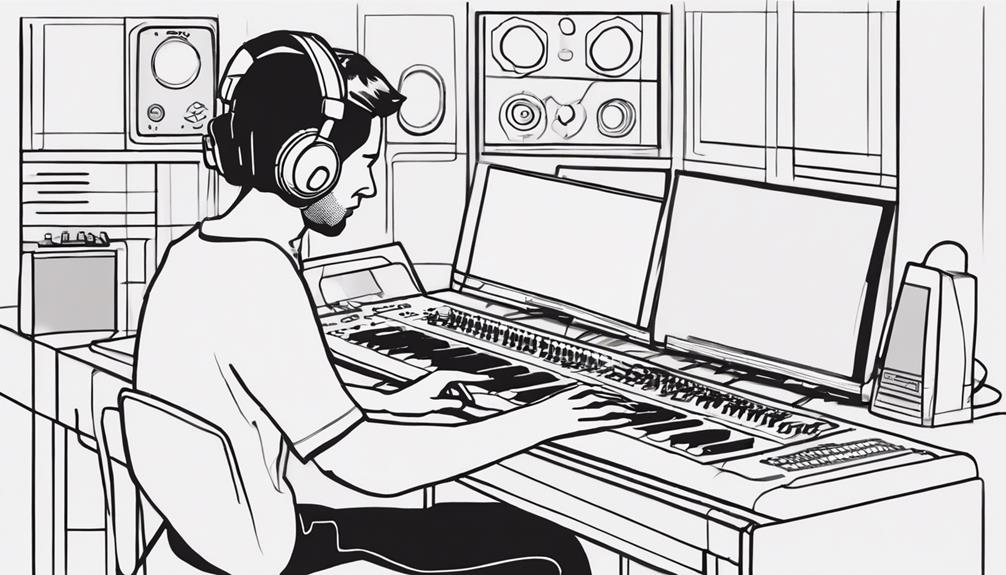
Consider selecting a Digital Audio Workstation (DAW) that aligns with your preferences and budget to kickstart your journey into electronic music production. Here are three essential tips for starting electronic music production:
- Invest Time in Learning:
Dedicate time to explore online tutorials, courses, and forums to grasp essential production techniques, software functionalities, and music theory concepts. Platforms like Sonic Academy, YouTube, and Udemy offer valuable resources to enhance your skills.
- Build a Quality Setup:
Enhance your music production setup by investing in quality studio headphones, studio monitors, MIDI controllers, and sound libraries. Having the right tools can greatly improve your sound design, mixing, and mastering capabilities.
- Experiment and Collaborate:
Experiment with different sound design techniques, MIDI sequencing, and effects to create unique sounds. Seek feedback from experienced producers, collaborate with other musicians, and attend workshops to accelerate your learning and growth in electronic music production. Your willingness to explore and collaborate will help you develop your signature sound and style.
Frequently Asked Questions
How Do I Start Learning Electronic Music?
To start learning electronic music, begin by familiarizing yourself with basic equipment. Choose a DAW, experiment with samples and plugins, focus on composition techniques, and seek online resources. Immerse yourself, have fun, and explore your creativity!
How Do I Teach Myself Music Production?
Start by immersing yourself in a Digital Audio Workstation (DAW). Explore online tutorials and forums to master production techniques. Experiment with samples and virtual instruments. Practice consistently. Seek feedback to enhance your skills.
Is It Hard to Learn How Do You Make EDM Music?
Learning how to make EDM music may feel challenging at first, but with dedication and practice, you can overcome the initial hurdles. Utilize online resources, experiment, collaborate, and stay updated to accelerate your learning process.
How Long Does It Take to Learn Electronic Music Production?
Learning electronic music production varies based on dedication. You can start creating basic tracks in weeks with practice. Mastering can take months to years, depending on complexity and goals. Commitment, practice, and seeking feedback accelerate progress.
Conclusion
To sum up, excelling in electronic music production demands commitment, practice, and patience.
Explore various subgenres, grasp song structures, and work together with fellow artists.
Make use of essential tools and educational resources to improve your skills.
Keep in mind, persistence pays off in this vibrant pursuit.
So, start moving, start creating, and get ready to shake up the electronic music world!

